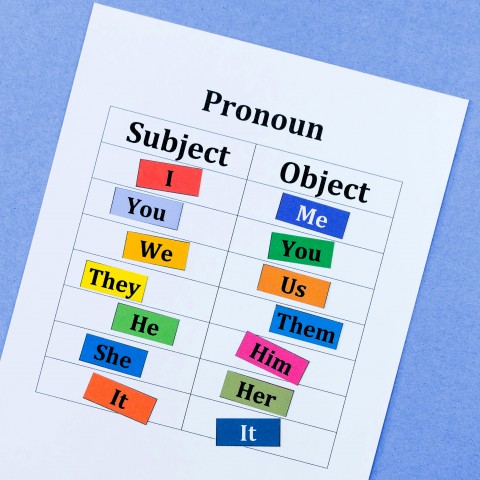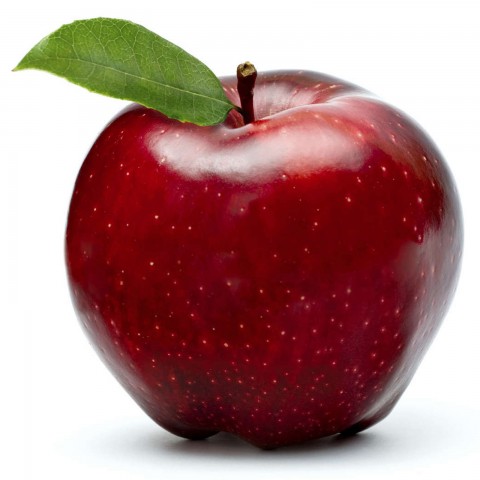
Are you a total beginner or a confident rookie in the Hungarian language? Would you like to test your knowledge or improve your skills? We at the HungarianPod101.com family offer you all the materials you need to take your Hungarian to the next level! A good way to strengthen your foundation is to gain a clear picture of Hungarian pronouns and how they work. They can be very confusing due to the number of suffixes involved, so we’ve collected the basic Hungarian pronouns for you with explanations and examples:
- Hungarian personal pronouns
- Hungarian demonstrative pronouns
- Hungarian interrogative pronouns
- Hungarian indefinite pronouns
- Hungarian relative pronouns
Phew, that’s a lot!
Using pronouns in Hungarian is one of the most basic grammar essentials for new learners—pronouns in any language should come very early in one’s studies. Without them, you wouldn’t be able to adequately express yourself when communicating with others. This is especially true for mid-European languages like Hungarian, which heavily rely on the proper use of pronouns.
Even though we’ve already collected the most useful Hungarian pronouns on our website, we know that context is key when learning such a complex language.
Enjoy your lesson!
 Table of Contents
Table of Contents
- Hungarian Personal Pronouns
- Hungarian Demonstrative Pronouns
- Hungarian Interrogative Pronouns
- Hungarian Indefinite Pronouns
- Hungarian Relative Pronouns
- Conclusion: How HungarianPod101.com Helps You Master Hungarian
1. Hungarian Personal Pronouns

The most important thing for Hungarians is knowing whom or what the conversation is about. For this reason, you’d better make sure you know which pronouns to use. So let’s begin with the Hungarian personal pronouns! As soon as you define the subject of a sentence, Hungarians will be more likely to understand you!
We have good—and not-so-good—news for you! Although there’s no such thing as gender differentiation in Hungarian pronouns or words (as is the case in every Slavic language), Hungarian pronouns aren’t as simple as their English equivalents. But at least you don’t need to worry about Hungarian gender pronouns!
1- Singular
This starts off easy – the singular Hungarian personal pronouns are the following:
én (“I”) Én szeretem a kutyákat.
I like dogs.”
te (“you”) Te szereted a kutyákat.
“You like dogs.”
ő (“he”) / (“she”) Ő szereti a kutyákat.
“He/She likes dogs.”
2- Plural
You’re still with us, right? Let’s check out the plural Hungarian personal pronouns, which are similar to and in line with those in other languages.
mi (“we”) Mi szeretjük a kutyákat.
“We like dogs.”
ti (“you”) Ti szeretitek a kutyákat.
“You like dogs.”
ők (“they”) Ők szeretik a kutyákat.
“They like dogs.”
Do you like dogs? Or are you a cat person? Okay then, the next sections will be about cats, we promise!
You can also find your favorite animal’s name on our animal vocabulary list.
3- Accusative case
When the object of the action becomes the subject, we start using the object forms. Here, you might get a glimpse of the differences between English and Hungarian pronouns.

engem (“me”) Engem karmolt meg a cica.
“The cat scratched me.”
téged (“you”) Téged karmolt meg a cica?
“Did the cat scratch you?”
őt (“him”) / (“her”) Őt karmolta meg a cica.
“The cat scratched him/her.”
minket (“us”) Minket karmolt meg a cica.
“The cat scratched us.”
titeket (“you”) Titeket karmolt meg a cica?
“Did the cat scratch you?”
őket (“them”) Őket karmolta meg a cica?
“Did the cat scratch them?”
Megkarmol means “to scratch,” with a target. Without a target, it’s just karmol. As a true cat-lover, we’re sure that you’ll love having this verb in your memory bank! 😉
4- Formal forms
Hungarian is a very polite language. Anyone who is significantly older than you, or is in a much higher hierarchical position than you are, should be addressed as:
Singular
ön (“you”) Ön hogy érzi magát ma reggel?
“How do you feel this morning?”
maga (“you”) Maga szereti a szőlőt?
“Do you like grapes?”
Plural
önök (“you”) Önök hogy érzik magukat ma reggel?
“How do you feel this morning?”
maguk (“you”) Maguk elolvasták a könyvet?
“Have you read the book?”
It’s recommended to use ön and önök in formal situations, as maga and maguk are more old-fashioned and considered a little bit rude depending on the situation.
5- Possessive form
Hungarians can be very possessive, and they don’t like to share their food (Japanese people, watch out!). But they love it when you share food with them…
They like to make it very clear what belongs to whom, so trust us when we say that these few words might save your life once! The Hungarian possessive pronouns are:
enyém (“mine”) Ez a kolbász az enyém.
“This sausage is mine.”
tiéd (“yours”) Ez a kolbász a tiéd.
“This sausage is yours.”
övé (“his”) / (“hers”) Ez a kolbász az övé.
“This sausage is his/hers.”
miénk (“ours”) Ez a kolbász a miénk.
“This sausage is ours.”
tiétek (“yours”) Ez a kolbász a tiétek.
“This sausage is yours.”
övék (“theirs”) Ez a kolbász az övék.
“This sausage is theirs.”
Kolbász is probably going to be one of the first words you’re going to learn when you spend some time in Hungary. It’s their traditional sausage made during the ritualistic family gathering where they slaughter the pigs.
For more restaurant- and food-related phrases, you can check out our relevant vocabulary list!
6- Reflexive pronouns
When the action is reflected back to the subject, Hungarian reflexive pronouns should be in your possession. These might be some of the most important Hungarian pronouns!
magam (“myself”) Megvágtam magam.
“I’ve cut myself.”
magad (“yourself”) Megvágtad magad?
“Have you cut yourself?”
maga (“himself”) / (“herself”) / (“itself”) Megvágta magát!
“He’s cut himself/herself!”
magunk (“ourselves”) Vigyázni fogunk magunkra.
“We will take care of ourselves.”
magatok(“yourselves”) Vigyázni fogtok magatokra?
“Will you take care of yourselves?”
maguk (“themselves”) Vigyázni fognak magukra.
“They will take care of themselves.”
Megvág is the word for “to cut,” with a target (like in the case of the cat’s scratching earlier in this article). Similarly, in the case of not having a target, it’s simply vág.
Hungarians can be very protective, so you might hear the expression Vigyázz magadra! a lot. It means “Take care of yourself!” and is often said when people are worried about their loved ones. The word vigyáz means “to look after” or “be careful,” so Vigyázz magadra! means something like “look after yourself” and “take care of yourself” at the same time.

2. Hungarian Demonstrative Pronouns
When it comes to objects, it’s good to know how to refer to them based on whom the object is closer to. Let’s learn some Hungarian demonstrative pronouns to help you out with this!
ez (“this”) Ez meg mi?
“What is this?”
az (“that”) Az micsoda?
“What is this?”
ezek (“these”) Ezek lámpák?
“Are these lamps?”
azok (“those”) Azok körték?
“Are those pears?”
ilyen (“such”) Miért ilyen kevés tejet vettél?
“Why did you buy such a small amount of milk?”
olyan (“that”) Olyan ruha volt rajta.
“She wore a dress like that.”
ennyi (“so much”) Ennyi vizet kell hozzáadni?
“Do you have to add so much water?”
annyi (“so many”) Annyi virágot hoztak, hogy nem tudtuk hova tenni.
“They brought so many flowers that we couldn’t figure out where to put them.”
For more home items, check out our vocabulary list!
3. Hungarian Interrogative Pronouns

In order to ask about people or objects, you’re going to require some Hungarian interrogative pronouns as well, so let’s see the most useful ones! If you’re a crime or thriller series fan, you’ll love these Hungarian pronouns!
mi (“what”) – singular Mi ez?
“What is this?”
mik (“what”) – plural Mik azok?
“What is this?”
melyik (“which”) – singular Melyik ajtón ment ki?
“What is this?”
melyek (“which”) – plural Melyek a használt edények?
“Which plates are used?”
ki (“who”) – singular Ki tette ezt?
“Which plates are used?”
kik (“who”) – plural Kik tehettek ilyesmit?
“Who could have done such a thing?”
kit (“whom”) Kit kérdeztél meg?
“Whom did you ask?”
kié (“whose”) Kié ez a bögre?
“Whose mug is this?”
hol (“where”) Hol a családom?
“Where is my family?”
mikor (“when”) Mikor találkozunk?
“When do we meet?”
miért (“why”) Miért nem vagy itt?
“Why aren’t you here?”
4. Hungarian Indefinite Pronouns

Let’s talk numbers here! What should you say when there are more people or things involved? Or no one? Everyone? Don’t worry, we’re just getting started with the indefinite pronouns. Let’s begin! But be aware: The grammar of Hungarian pronouns just gets crazier from here.
mindenki (“everyone”) / (“everybody”) Mindenki szereti a cicákat.
“Everyone likes cats.”
senki (“no one”) / (“nobody”) Senki nem szereti a hörcsögöket.
“No one likes hamsters.”
bárki (“anyone”) / (“anybody”) Bárki örökbe fogadhat egy kutyát.
“Anyone can adopt a dog.”
valaki (“someone”) / (“somebody”) Valaki megetette a nyulamat.
” “Someone has fed my rabbit.”
minden (“everything”) Minden a te hibád!
“Everything is your fault!”
semmi (“nothing”) Semmi nincs rendben!
“Nothing is alright!”
bármi (“anything”) Bármi jó lesz.
“Anything will do.”
valami (“something”) Valami baj van?
“Is something wrong?”
5. Hungarian Relative Pronouns

Hungarian interrogative pronouns change when they become relative. They extend with an a at the beginning. Let’s see some examples below of Hungarian relative pronouns:
ami (“what”) Ami nekem nem tetszik…
“What I don’t like…”
amik (“what”) – plural Utálom azokat az almákat, amik sárgák.
“I hate the apples which are yellow.”
As you can see above, in English, we differentiate between the singular “what” and plural “which” forms. Hungarians make this difference by adding a -k after ami. They use ami in singular forms and amik in plural forms.
aki (“who”) A lány, akit szerettem, elköltözött.
“The girl I loved moved out.”
akik (“who”) – plural Viccesek, akik jó humorral rendelkeznek.
“The ones who have a great sense of humor are funny.”
amelyik (“which”) Azt az almát kérem, amelyik piros.
“I want the apple which is red.”
amelyek (“which”) – plural Azokat a lovakat szeretem, amelyek feketék.
“I love the horses which are black.”
amilyen (“the kind of which”) Olyan vagy, amilyen az apád volt.
“You are just like your father was.”
amekkora (“the size of which”) Akkorát kérek, amekkora a Petinek van!
“I want the size of what Peti has.”
amennyi (“the cost [amount] of which”) Annyim van, amennyi ez a kabát.
“I have as much as the cost of this coat.”
ahányadik (“the sequence of which”) Annyi éves vagyok, ahányadik a piros hajó a sorban.
“I am as old as the red boat’s rank in the line.”
6. Conclusion: How HungarianPod101.com Helps You Master Hungarian
It’s essential to master Hungarian language pronouns to master this beautiful language. After going through our list and doing a bit of practice, we highly recommend that you check out our resources about introducing yourself in Hungarian and saying hello in Hungarian.
If you’re already interested in learning Hungarian pronouns, we take your interest seriously. We always welcome dedicated people, so if you’re interested in continuing your journey in one of the world’s most difficult languages, don’t hesitate to join the HungarianPod101 family! We have all the essential learning materials you need to get confident using the Hungarian language.
We hope that you enjoyed our Hungarian pronouns article. Please let us know in the comments which one seems to be the craziest of all! We’ll be glad to answer any questions you still have.
Happy Hungarian learning!










